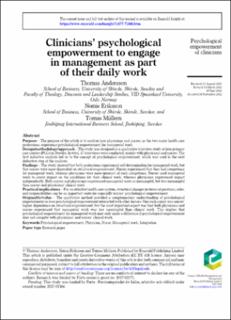| dc.contributor.author | Andersson, Thomas | |
| dc.contributor.author | Eriksson, Nomie | |
| dc.contributor.author | Müllern, Tomas | |
| dc.date.accessioned | 2022-12-21T13:29:09Z | |
| dc.date.available | 2022-12-21T13:29:09Z | |
| dc.date.created | 2022-12-16T14:36:29Z | |
| dc.date.issued | 2022 | |
| dc.identifier.citation | Journal of Health Organisation and Management. 2022, 1-16. | en_US |
| dc.identifier.issn | 1477-7266 | |
| dc.identifier.uri | https://hdl.handle.net/11250/3039074 | |
| dc.description | This article is published under the Creative Commons Attribution (CC BY 4.0) licence. Anyone may reproduce, distribute, translate and create derivative works of this article (for both commercial and noncommercial purposes), subject to full attribution to the original publication and authors. The full terms of this licence may be seen at http://creativecommons.org/licences/by/4.0/legalcode | en_US |
| dc.description.abstract | Purpose – The purpose of the article is to analyze how physicians and nurses, as the two major health care professions, experience psychological empowerment for managerial work.
Design/methodology/approach – The study was designed as a qualitative interview study at four primary care centers (PCCs) in Sweden. In total, 47 interviews were conducted, mainly with physicians and nurses. The first inductive analysis led us to the concept of psychological empowerment, which was used in the next deductive step of the analysis.
Findings – The study showed that both professions experienced self-determination for managerial work, but that nurses were more dependent on structural empowerment. Nurses experienced that they had competence for managerial work, whereas physicians were more ignorant of such competence. Nurses used managerial work to create impact on the conditions for their clinical work, whereas physicians experienced impact independently. Both nurses and physicians experienced managerial work as meaningful, but less meaningful than nurses and physicians’ clinical work.
Practical implications – For an effective health care system, structural changes in terms of positions, roles, and responsibilities can be an important route for especially nurses’ psychological empowerment.
Originality/value – The qualitative method provided a complementary understanding of psychological empowerment on how psychological empowerment interacted with other factors. One such aspect was nurses’ higher dependence on structural empowerment, but the most important aspect was that both physicians and nurses experienced that managerial work was less meaningful than clinical work. This implies that psychological empowerment for managerial work may only make a difference if psychological empowerment does not compete with physicians’ and nurses’ clinical work. | en_US |
| dc.language.iso | eng | en_US |
| dc.publisher | Emerald Group Publishing Limited | en_US |
| dc.rights | Navngivelse 4.0 Internasjonal | * |
| dc.rights.uri | http://creativecommons.org/licenses/by/4.0/deed.no | * |
| dc.subject | integration | en_US |
| dc.subject | managerial work | en_US |
| dc.subject | nurse | en_US |
| dc.subject | physician | en_US |
| dc.subject | psychological empowerment | en_US |
| dc.title | Clinicians' psychological empowerment to engage in management as part of their daily work | en_US |
| dc.type | Peer reviewed | en_US |
| dc.type | Journal article | en_US |
| dc.description.version | publishedVersion | en_US |
| dc.rights.holder | © Thomas Andersson, Nomie Eriksson and Tomas Mullern. Published by Emerald Publishing Limited | en_US |
| dc.source.pagenumber | 1-16 | en_US |
| dc.source.journal | Journal of Health Organisation and Management | en_US |
| dc.identifier.doi | 10.1108/JHOM-08-2021-0300 | |
| dc.identifier.cristin | 2094484 | |
| cristin.ispublished | true | |
| cristin.fulltext | original | |
| cristin.qualitycode | 1 | |

